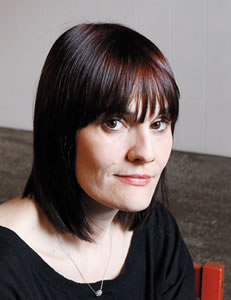Katrina Onstad (MA 1999) might be best known for her national newspaper and magazine columns, but her debut novel How Happy to Be was celebrated for its satire, wit, and examination of loving and working in the 21st century. In her new novel, Everybody Has Everything, Onstad takes a similar approach, once again considering the isolating aspects of contemporary urban life. Through her characters James and Ana, she uses the perspective of a longchildless couple to take a provocative look at modern parenthood, illuminating the absurdity of a culture that has turned “parent” into a verb.
James and Ana are summoned to parenthood by a text message and a phone call. A tragic car accident has occurred, and they are shocked to find themselves entrusted with care of their friends’ two-year-old son, Finn. The boy’s arrival in their home rocks James and Ana’s relationship to the core, their untraditional path to parenthood bringing not only unique challenges but also those typical to many families – balancing child care, dealing with tantrums and finding time for romance. Onstad has broadened the narrative of family life to include several new realities. After years of invasive fertility treatments and miscarriages, Ana has only recently made peace with the fact that she is unlikely to have a biological child of her own. Once she becomes Finn’s guardian, she is forced to juggle impossible competing expectations from home, in her work as a successful lawyer and in her responsibility to care for her ailing mother.
For James, underemployment has him questioning notions of manhood and his role as husband and provider. Long a purveyor of anti-sentimentality, he is also surprised and overwhelmed by the force of his feelings for Finn, by the connection between them that makes him feel like an adult for the first time in his life.
Ana’s connection to Finn is less straightforward. When he arrives, the maternal feelings fail to. Onstad’s novel dares to pose the still-controversial questions: What is parenthood beyond the biological connection? And is every woman really meant to be a mother?
Recent Posts
People Worry That AI Will Replace Workers. But It Could Make Some More Productive
These scholars say artificial intelligence could help reduce income inequality
A Sentinel for Global Health
AI is promising a better – and faster – way to monitor the world for emerging medical threats
The Age of Deception
AI is generating a disinformation arms race. The window to stop it may be closing




